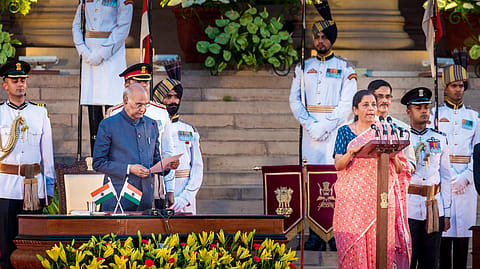With Sitharaman, be prepared to debate
The first-time finance minister would have been at her job for just over a month when she announces her maiden Budget. How would she respond to industry recommendations?

It is that time of year when the industry associations and trade bodies make a beeline for North Block in Delhi that houses the finance ministry to present their wish lists: the pressing issues that are hurting their industry and what is it they expect in the Budget from the finance minister to grow their businesses.
Those who can’t get an audience with the ministry officials often send a detailed memorandum outlining their demands. As they vie for the new finance minister’s attention, it may be well worth to know a little about how she tackles the issues before her.
For starters, Nirmala Sitharaman has been through the grind that makes finance ministers understand the nitty-gritty of industry and business. Like her predecessor Arun Jaitley, Sitharaman has cut her teeth in the commerce industry, which is more exposed to the how Indian industries are placed in a global context. Jaitley, who represented India at the World Trade Organization (WTO) sessions in Cancun, told the struggling Indian garment industry to grow up and face the global challenges rather than complain during his term.
Sitharaman did not concede much in the WTO though she could not conclude the much anticipated Indo-European Union Free Trade agreement which would have boosted India's textile exports, among other commodities. Incidentally, Sitharaman after graduating in Economics went on to do her masters at Jawaharlal Nehru University, researching on the textile industry and Indo-European trade. In the early days in the commerce ministry, Sitharaman allowed a notification to allow anti-dumping duty on solar panels from China to lapse as she wanted local industry to be competitive.
But, what stands out about Sitharaman is that she can turn even simple queries or suggestions into a debate, taking her audience by surprise. At an event listening to an industry body in Tamil Nadu, she met a bunch of small scale industrialists who were telling her their state of affairs. One industrialist present in the meeting remarked that business had become tough as the Chinese were making strong inroads in even traditional Indian markets—like making Ganesha idols and out-pricing local players. Sitharaman quipped that the locals should start manufacturing Buddha idols and flood the Chinese market. A senior industrialist present in the meeting said that subsequently those present in the room did not bring up any more issues with the minister as they feared how she would react.
Sitharaman, who served as her party’s spokesperson while in the Opposition, is best remembered for her debate in Parliament early this year. As the defence minister, she creditably refuted the charges leveled by Congress president Rahul Gandhi on the Rafale aircraft deal.
Sitharaman credits her debating abilities to her college principal at the Seethalakshmi Ramaswami College in Tiruchirapalli (Trichy), a temple town in Tamil Nadu, who pushed her to speak in public and made her participate in debating competitions. While visiting the town as defence minister, Sitharaman couldn't help pointing out that Coimbatore, another town in the state, had more entrepreneurial spirit than Trichy, though she asked the audience to take her words in the right spirit.
Recommended Stories
Sitharaman also likes brevity. During a recent visit to an inauguration of a renovated girls school in Chennai at the behest of the local Rotary Club, she insisted that any introduction about her should not be over 30 seconds. Despite a busy schedule, she decided to drop in at the school as she supported the cause of the girl child and spoke for exactly 20 minutes as she had promised.